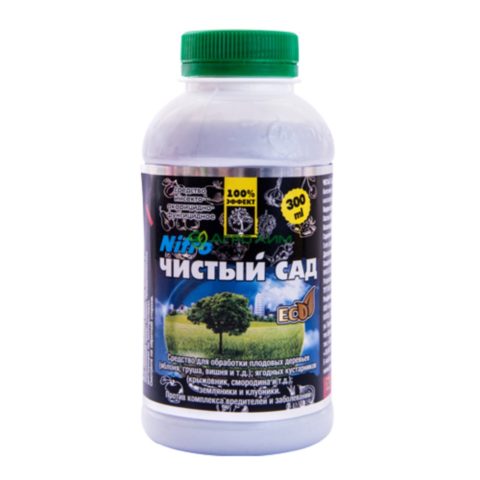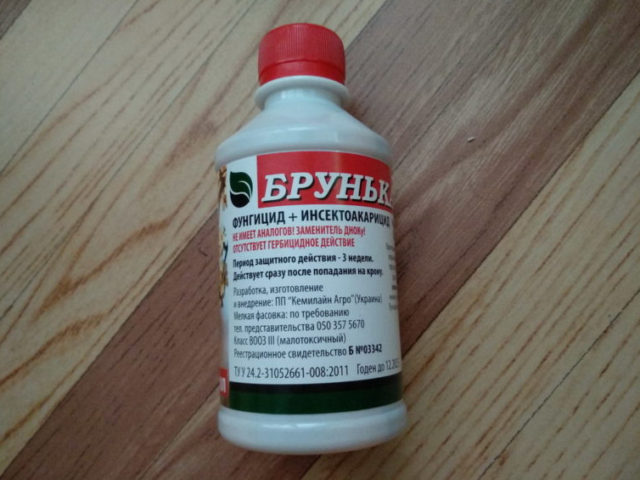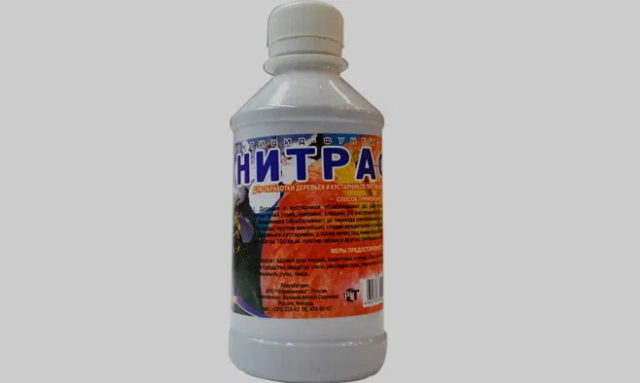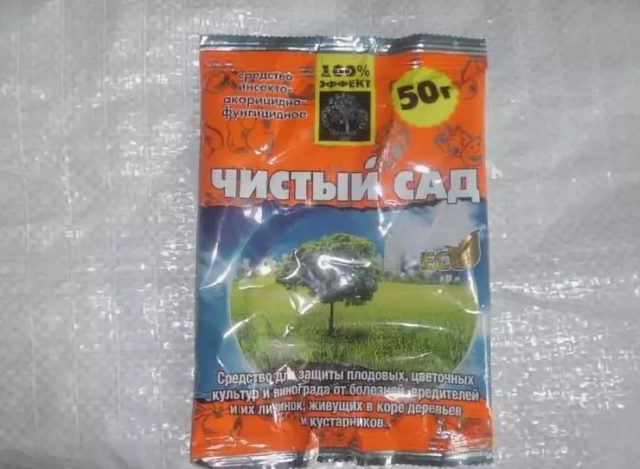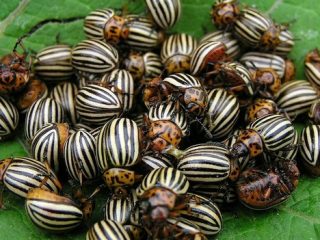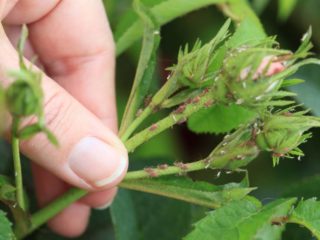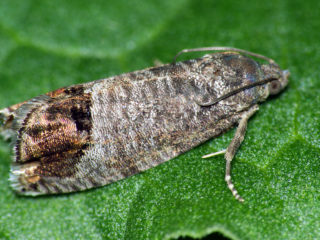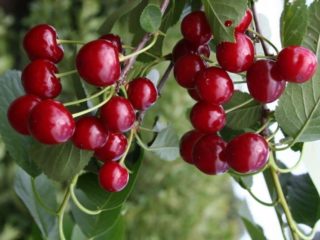Content
Every gardener understands that it is impossible to grow a good harvest without treatment from pests and diseases. Now the range of chemicals is very diverse, but only some of them have a wide spectrum of action and combine acaricidal, insecticidal and fungicidal properties at the same time. One of such universal means is the Dnock spray preparation. But in order to use it correctly, you must first study the instructions.
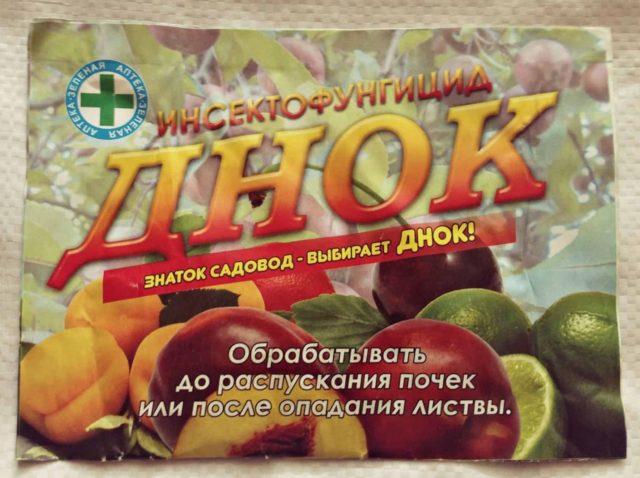
The persistent effect of the use of "Dnoka" lasts for 1 month
Description of the drug
Fungicide "Dnok" has a second class of toxicity. This means that it can harm plants and human health if used improperly.
Composition
The fungicide is released in the form of a yellow powder with a pungent unpleasant odor. The main active ingredient is dinitroorthocresol, which is present in 40% concentration. Sodium and ammonium sulfate act as additional ingredients. This increases the effectiveness of "Dnoka", and the active ingredient is evenly distributed in the product.
Operating principle
When spraying plants, the fungicide "Dnok" inhibits the development of fungal spores, prevents their reproduction. And since the agent also has acaricidal and insecticidal properties, it also destroys larvae and adults of wintering pest species. The maximum concentration of the active substance in the tissues of the plant is recorded 48 hours after the garden has been treated with Dnokom. You can clearly see a positive result on the 4th day after spraying the foliage.
What diseases and pests are used for
According to experienced gardeners, the drug "Dnok" for spraying the garden simplifies the care of plants, since one treatment replaces several.
The drug should be sprayed with wintering pest species:
- shield;
- leaf roll;
- aphid;
- ticks;
- honeydew;
- mole;
- moth;
- false shield;
- worm.
Due to its versatility, the Dnok product can be used against most fungal diseases that persist on trees, berry bushes and grapes in winter.
The use of the drug is justified when:
- spotting;
- curliness;
- moniliosis;
- scab;
- coccomycosis;
- oidium;
- anthracnose;
- necrosis;
- cercosporium disease;
- rust;
- powdery mildew;
- gray rot;
- mildey.
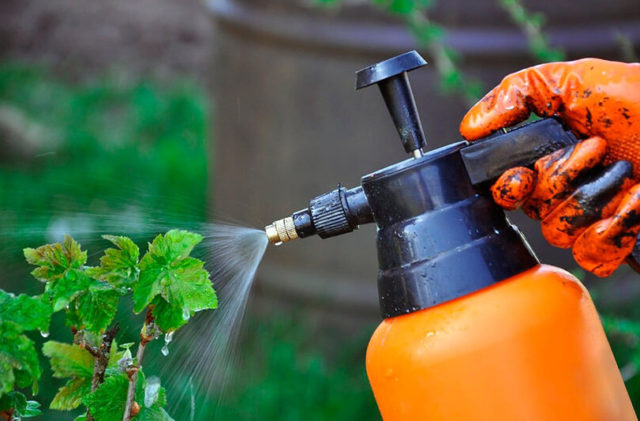
Opening buds, ovary, young shoots and buds are sensitive to the action of "Dnoka"
Consumption rates
The amount of the working preparation "Dnoka" varies depending on the cultivated crop. Therefore, to achieve maximum efficiency, you should strictly adhere to the instructions. Excessive dosage can have negative effects on plants.
Recommended consumption of working solution "Dnoka":
- 10l / 100 sq. m.- stone fruit trees;
- 15l / 100 sq. m. - seed crops, berry bushes;
- 8 l / 10sq. m. - grapes.
Application area
The preparation "Dnok" for spraying, according to the instructions for use, is intended for spring and autumn processing of gardens and vineyards on an industrial scale. The fungicide destroys pathogens overwintering on plants.
Is it possible to use gardeners and gardeners
Due to the high toxicity of "Dnoka" it is not recommended to use it privately. But, according to experts, the fungicide can be used to treat trees and shrubs if the plantings are located at a distance of 1 km from residential premises. It is also important to follow all safety precautions.
Instructions for use of the drug Dnock
In accordance with the instructions "Dnok" (double blow) must be used at certain times of the year. And also during the preparation of the fungicide solution, strictly adhere to the dosage.
When is it better to carry out the treatment with Dnock
Spray with "Bottom" should be in early spring and late autumn. In the first case, it is necessary to carry out the treatment until the appearance of the kidneys. Therefore, when the positive temperature comes, not lower than +4 degrees, a fungicide should be used. It is important to have time to carry out the treatment before the start of sap flow, since it is at this time that the product shows maximum efficiency.
In the second case, the fungicide should be used after leaf fall and at the end of all work with the soil under shrubs or trees, but the air temperature should not be higher than +5 degrees.
Application in the fall of "Dnoka" means spraying branches, trunk and topsoil with fallen leaves. For such treatment, it is recommended to use a 0.5-1% fungicide solution. At low air temperatures, the active component "Dnoka" penetrates into the soil to a depth of 7 cm and thus destroys pathogens and pests that winter not only on the plant, but also in the upper soil layer.
Preparation of the solution
To prepare the working solution "Dnoka", initially pour 500 ml of warm water into a separate container, and then add 50-100 g of the preparation powder to it, stir thoroughly. Then bring the volume of liquid to 10 liters.
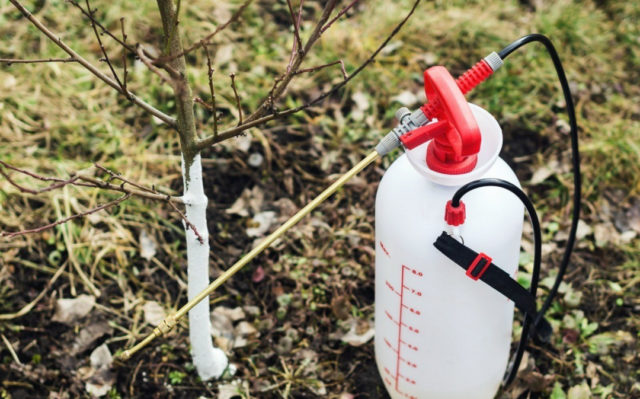
The drug is poorly soluble in cold water
Rules for using Dnoka
Depending on the type of culture, the fungicide needs to be used in different ways. In the case of application in spring, the concentration of the active component should not exceed 4%, which is achieved by dissolving 400 g of powder in 10 liters of water. And with the autumn treatment with "Bottom" - no more than 1% at the rate of 100 g of funds for a bucket of water.
Processing fruit trees with the bottom
The drug "Dnok" is recommended to be used for stone fruit trees (apricot, plum, cherry, peach) and pome crops (apple, pear, quince).
Processing must be done against such pests:
- shield;
- varieties of ticks;
- honeydew;
- leaf roll;
- mole;
- aphid;
- flies;
- moth.
Also, timely spraying of trees with "Bottom" helps to destroy the pathogens of curliness, spotting, clotterosporia, coccomycosis, moniliosis and scab. The consumption rate of the fungicide working solution is 10-15 liters per 100 sq. m. plantings.
How to use Bottom for grapes
Before processing this crop, you should first prune. It is necessary to start the procedure immediately after the end of the preparatory stage.
Bottom treatment of grapes helps prevent the spread of ticks, worms and aphids.As a fungicide, this drug is effective against:
- anthracnose;
- oidium;
- spotting;
- cercosporosis;
- necrosis.
In this case, the consumption of the working solution "Dnoka" should not exceed 8 liters per 100 square meters. m.
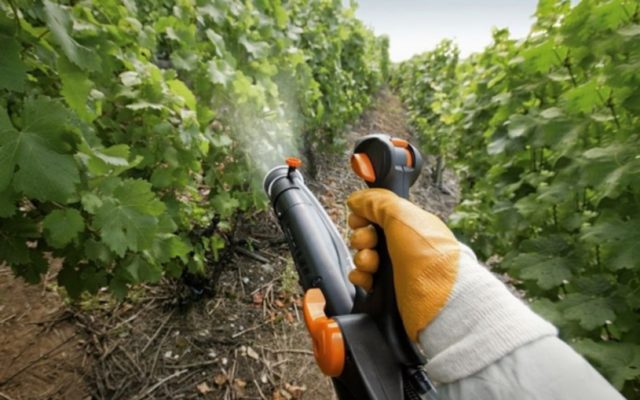
You need to spray before the start of sap flow in plants.
Bottom spraying of berry bushes
This preparation is also recommended for the processing of gooseberries and currants. According to the instructions, it helps to get rid of:
- aphids;
- scabbards;
- leaf rollers;
- moths;
- false shields;
- ticks.
The use of this fungicide is also justified against diseases such as powdery mildew, septoria, rust, spotting and anthracnose. The flow rate of the working fluid when spraying shrubs should be within 15 liters per 100 sq. m.
Advantages and disadvantages
"Dnok", like other drugs, has pluses and minuses. Therefore, before deciding on a choice, you need to familiarize yourself with them in advance.
Advantages of Dnoka:
- Versatility of application.
- A wide range of actions.
- Economical consumption.
- Long lasting protective effect.
- Affordable price.
The disadvantages of the fungicide include class 2 toxicity, which requires increased safety measures. In addition, young seedlings should not be sprayed with "Dnock", as this leads to a slowdown in their growth and the appearance of burns on the bark.
Precautions
Judging by the reviews, "Dnok" (double blow) is one of the most effective drugs that have a detrimental effect on most common garden pests and pathogens of fungal diseases. But you need to use it with caution.
Work with the fungicide should be carried out in special clothing and a protective mask on the face, since when the solution gets on the skin and mucous membrane, severe irritation occurs. You can use the fungicide no closer than 2 km from water bodies.
After spraying, you need to take a shower, wash work clothes, and wash the spray bottle with a soda solution. If you accidentally swallow the working drug "Dnoka", you should not drink alcohol, hot drinks, fats, and also make compresses.
Storage rules
The fungicide can only be stored if the packaging is intact. The shelf life of the powder is 3 years from the date of production. Store the product in a dark, dry place out of the reach of children.
Dnoka powder is explosive, so you shouldn't put the product near containers with flammable liquids.
How long is the diluted Dnok stored?
The shelf life of the ready-made Dnoka solution does not exceed 2 hours. Therefore, it is necessary to use the product immediately after preparation. In this case, it is necessary to clearly calculate the required amount of the drug for processing, since it is impractical to prepare it for future use.
Analogs
In the absence of "Dnoka", you can use other chemicals that have a similar effect. Each of them must be used in accordance with the attached instructions.
Analogs of "Dnoka":
- Pure garden of Nitro.
- Brunka.
- Nitrafen.
- Clean Garden.
Conclusion
Dnock spraying product is highly effective when used correctly. But the high level of toxicity does not allow it to be used everywhere. Therefore, experts recommend using "Dnok" only in special cases when drugs of a gentle action have not brought positive results. And at the same time, one should not forget that this remedy can be used no more than 1 time in 3 years.
